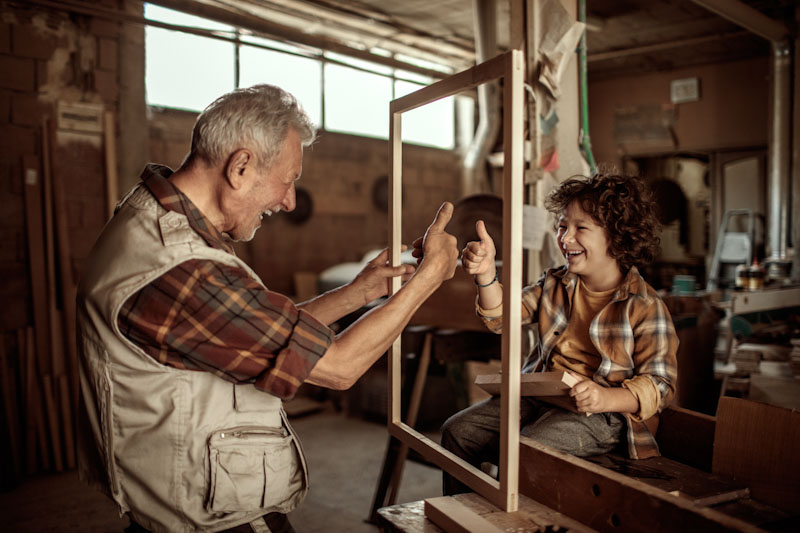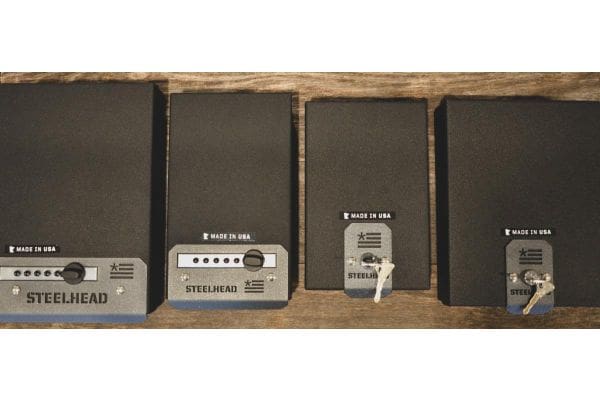My childhood was full of joy and rewarding experiences, and I owe it all to my grandparents since they were the ones who took care of my brother and me most of the time. While I don’t always see eye to eye with my brother, we do agree on one thing: we wouldn’t be the people we are today if it wasn’t for our grandparents.
Like many from my generation, I used to spend a lot of time in the countryside during the summer months, and I now realize that everything we did back then has built our character. Many of the lessons our grandparents taught us have stayed with us over the years.

My grandparents lived a simple life, and no matter how busy they were, we were always involved in their activities. They would always find time to teach us a thing or two. Some of the skills they taught us are now considered survival skills, but back then, it was nothing more than daily life and a way to sustain self-sufficiency. That being said, below is a list of skills I’ve learned from them.
Survival skills my grandparents taught me:
Foraging
I consider myself to be somewhat of a skilled forager, and I owe it all to my grandfather. As a side note, I don’t really like when people use the word “expert” when referring to foragers, survivalists, preppers, and other such activities because you rarely can become an expert unless, of course, you spend all your time training and functioning in a certain environment that hones a particular set of skills.
I started exploring the wilderness at a young age, and I believe it to be my first playground. Both my brother and I would cry our hearts out, begging our grandpa to take us with him when he went foraging or hunting. It was our main form of play and learning, and it would come before even watching TV. I realized that some of his lessons stayed with me, and I also understood why some of the advice found online is wrong or downright dangerous.
Here are just a few examples of why foraging is more than what it is being portrayed as and some of the truths that nobody talks about:
1. Foraging cannot provide complete nutrition and cannot offer enough food to sustain life long-term. Foraging is more of a way to supplement one’s diet, and while it can help you survive when food is scarce for a brief period of time, it shouldn’t be used as your primary way of food procurement.
2. Most foraging manuals are nothing more than paperweights. While some provide good information and basic knowledge in identifying certain plants, often there isn’t enough information in these books. In fact, making a complete foraging manual is impossible, and these types of learning books should concentrate on certain plants or certain regions. The visual aid (photos for identification) should be diverse and include photos of the leaves (front and back), root, stem/trunk, flowers, seeds, fruits, and the whole plant during the various stages of its growth. I understand that due to printing limitations, this is somewhat impossible, and I advise people to search for more information about a specific plant to familiarize themselves with it when they want to know more about that plant.
3. Foraging requires you to get down and dirty, and as my grandfather used to say, you need to become part of the plant’s life and know it from seed to adulthood. This can only be done with fieldwork, and it’s a complex activity because you need to examine plants throughout the entire year. Considering that many plants have lookalikes and sometimes they grow in close vicinity, only by paying close attention and checking the plants regularly will you be able to make a positive identification. You can take pictures of a certain plant and make your own guide with all the visual aids required as specified in the previous paragraph.
Staying organized
One thing I’ve learned from my grandparents is to make lists and become organized. This soft skill has helped me a lot during my prepping journey and has saved me many headaches. They used to keep lists for everything, from basic grocery lists to journals about the feeding habits of their animals, crop seasonal patterns and yields, and so on. Everything was written down, and they made sure nothing was left to chance when it came to their supplies or various activities. They even had written records of various farm jobs that required multiple hands on deck, so to speak. They made schedules for the various tasks, noting who helped, who required help, and so on.
Staying organized was and still is a skill that helps save a lot of time in the long run, and if you’re a prepper, I advise you to keep your things organized. I have everything labeled and organized based on priority, needs, and other factors such as expiration date, time of use, maintenance, need for replacement, and so on.
The younger generation has brought their organization skills to another level with the help of technology, but even so, they often can’t stick to a simple shopping list, don’t keep a record of what they own, and fail to plan their leisure activities, with everything seeming to be “last minute.”
Caring for animals
I grew up surrounded by animals and have a deep respect for each living creature. I learned to nurture farm animals from a young age, as they not only provided companionship but also sustenance. The same goes for wild animals, and I remember that my grandpa was the first person who educated me about firearms and hunting. I never practiced hunting for sport, and to this day, I don’t find that appealing. I learned to respect the animal and provide a humane death. Nothing goes to waste, and every part of the animal is used. There should be no other way.
Caring for animals helped me understand the value of each animal when it comes to self-sufficiency and how difficult it is to take care of each animal and the dangers some of them pose. For example, some people decide to get a milk cow for their family and have no idea how difficult it is to care for such an animal or what to do with the milk surplus the cow provides. Another example is the suggestion to grow rabbits as a source of protein, but that’s far from the right solution because rabbit meat is low in fat, and consuming it excessively will lead to protein poisoning.
Cooking
This is one of the survival skills that has stayed with me to this day, and I’m able to cook a meal in any environment with the various types of fuel I can scavenge. Not only am I able to prepare and cook meals in “austere environments,” but so far, I’ve been able to prepare various dishes better than everyone I’ve met (including my wife).
Cooking is a survival skill that becomes indispensable when the modern fabric of our society gets torn, and making tasty and nutritious meals from scraps is an incredible morale boost. My grandmother used to keep us close by when she prepared our food and taught us how to become independent. She used to joke that we should behave differently than our grandpa and give the women in our lives a break from the kitchen every now and then because a happy wife makes a happy life. Furthermore, when we wanted something to ease our sweet tooth, she would provide us with the ingredients and simply say, “get at it, boys.”
I realized over the years that I’m doing the same thing with my nephews, and every time we go camping, they get fully involved in the cooking process. They swear the food they cook tastes better than anything else.


Appreciating the value of things
I’ve talked about reusing and recycling items quite a lot in my work, and it’s one of the things I learned from my grandparents as well. As a side note, I learned to sew and mend my clothes thanks to my grandmother, and she was the one who convinced us that clothes deserve a second and third chance and shouldn’t be thrown away so easily.
Almost everything was reused and repurposed around the house, and it was not only about saving money; it was also about putting your mind to work. My grandpa told me that before throwing something away, take a good look at it and imagine if you could give it another purpose. I do that to this day, and I try to reuse stuff as much as possible. My wife is afraid that I will become a hoarder, and she often tells me that I should focus more on the recycling part and less on the reusing part.
Today, a lot of people no longer appreciate the things they have, and they no longer utilize their creativity or engage in hands-on activities. Everything is delivered and handled without much hassle, and we discard old stuff too easily. However, when the brown stuff hits the fan and stores remain closed indefinitely, your DIY skills will come in handy if you’ve been practicing the art of reinventing things.
A last word
It amazes me how the old ways of doing things are now seen as peculiar ways of living and are considered more survival skills than anything else. Today’s modern man looks at their grandparents as somewhat technology-challenged people rather than resourceful and self-sufficient folks. It also saddens me that the new generations have lost touch with reality, and most of them won’t be able to experience the things we had the chance to live back in the day.
Read the full article here




